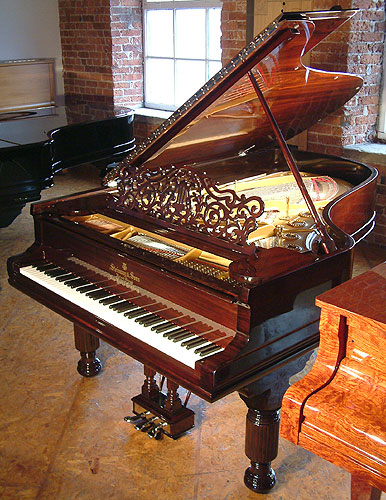
There are other days when everything I play seems just lifeless and wooden, the simplest of pieces has notes which I thought were never there before, improvising is an uphill struggle and I wonder why on earth anyone bothered to invent the piano! Out of all the different instruments I play, the piano is the most lovely and beautiful, but it can also be the most frustrating and unforgiving master. My relationship with this instrument is the most challenging and often therefore the most rewarding when it works well.
I believe that when one plays the piano very much is dependent on the attitude and mood with which it is approached. You have to be on the right wavelength to get good results. However, this should not be an excuse for not practising regularly, after all any good relationship has to be worked at.
Apart from the sheer enjoyment and satisfaction of playing the piano, I believe there are many benefits to the body and the mind of indulging in what may appear to many to be a selfish activity when it often takes place (especially in my situation) in the silence of ones own home.
In terms of the physical aspects of playing the piano there are a number of considerations.
1) Playing the piano involves use of a whole lot of the body, the fingers, hands, arms, shoulders, neck, back, and feet. In fact when you watch a professional pianist playing, for example, a Rachmaninov piano concerto, he or she often appears to be having a complete physical workout.
2) Piano playing develops co-ordination between the left and right sides of the body, which are controlled respectively by the right and left sides of the brain. For youngsters, especially those inclined towards dyspraxia or lack of developed co-ordination this can be of great benefit, especially in the early stages.
3) In piano playing relaxation is produced physically through the tension and relaxation of specific muscle groups and through the flowing body movements which are required.
4) Playing the piano helps to produce faster physical responses and reactions. Apparently a lot of youngsters develop quick reactions through playing computer games, perhaps playing the piano would enable them to find another alternative means of achieving this goal. It would also give them a welcome change of activity.
I want to outline now a few of the mental and emotional benefits of playing the piano which overlap and interact with the physical benefits I have investigated earlier.
1) Piano playing focuses the mind very effectively, as the performer has to read the music and internally hear the music before playing it. This involves great power of concentration, more than that required for reading where the words read remain internalised rather than being externally projected through the body into physical action.
2) The projection and expression of feelings and emotions into the music can be a cathartic experience, similar to that which can be achieved through drama, dance and painting.
3) In playing the piano, if one allows the music to work its way through the mind and body, there can be a great emotional release. This can have an effect on enhancing our problem solving abilities and enable the mind to be free for further creative thinking and activities.
The above lists are by no means exhaustive, I'm sure many of you could comment on other physical and mental benefits to be gained by playing the piano.
I have found through my own experience of teaching piano over the last 25 years or so, that piano playing can be very helpful for those experiencing ADHD, dyslexia, dyspraxia, trauma, grief and emotional turmoil. It can bring order and structure to a world view that is distorted and help to restore relationships which are broken. I have seen many people helped through their own musical playing experience and discovery of some of the world's great music.
The piano may be regarded as a miniature orchestra in itself. In future articles I intend to explore how to get started with playing the piano, how to find the right instrument and look at aspects of the wide repertoire available.
If you have any comments or questions about this introductory article please email me at erikretallick@yahoo.co.uk
No comments:
Post a Comment